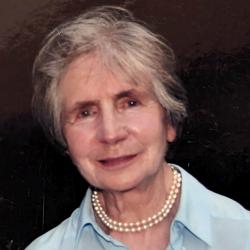
A pioneer in UK nephrology and, as one of a handful of women academic physicians of her era, she oversaw one of the early services for acute renal failure in the UK, and was closely involved in the earliest successful transplant programme. Subsequently she was renowned for her clear teaching, nurturing of trainees and personal care of her patients.
Anne Lambie was still 16 when she started at Edinburgh Medical School in the Autumn of 1945, the youngest in her year. She graduated in 1950 with the Ettles scholarship as most distinguished undergraduate. Very few other women from her year became consultants in Medicine or Surgery.
After house jobs she was SHO and then registrar to Professor Derrick Dunlop, a sought-after post, and planned a career in endocrinology. In 1954-56 she spent two years in Arnold ‘Bud’ Relman’s lab in Boston investigating renal transport of potassium and acid-base balance. Here she saw occasional patients with physiological disturbances, and briefly encountered the Kolff-Brigham dialysis machine that had been proven effective in the Korean War (1950-53). On her return to Dunlop’s metabolic/endocrine ward as lecturer, she was fascinated by the improvements in the condition of patients with chronic renal failure that could be achieved by attention to acidosis, fluid balance, and diet.
Her career took a distinct turn with the arrival of a dialysis machine in Edinburgh in 1959, one of the first half dozen in the UK. She joined her colleague Dr Jim Robson to start the new acute renal failure service, which she subsequently led into the 1980s. She described the apparently miraculous survival of young patients with severe ARF (AKI) as one of the high points of her career. Early dialysis also involved creating and working with some of the first true multidisciplinary teams, involving nurses, technicians, laboratory staff, dietitians, and surgeons as well as physicians. Ten years later this bonding was strengthened by the terrible experience of a lethal hepatitis epidemic in Edinburgh which deeply affected all in the unit, and threatened the continuation of dialysis, the low point in her career.
She was also centrally involved in the first successful kidney transplants in the UK, between identical twins in 1960 (surgeon Michael Woodruff), subsequently using whole body irradiation, azathioprine (second patient in the world to receive this), and locally produced anti-lymphocyte serum.
She was a frequent and highly regarded undergraduate and postgraduate teacher, noted for the careful preparation and clarity of her lectures. “Her reputation as a clear expositor in teaching is unsurpassed”, a colleague wrote. In the 1970s she led aspects of medical curriculum reform, introducing clinical teaching into the early years of the programme. In later life she detailed how she coped with some difficult personalities and attitudes towards women. She finished a 1990 account by saying that she had been very fortunate in the unexpected direction of her career, and in her colleagues, “one or two of whom may even rank with Ian Grant’s ‘towering, often autocratic and unreasonable giants of the past’.” Tolerating the unreasonable and autocratic elements was a testament to her patience and resilience.
Junior clinical colleagues and other staff remember her as a calm and sensible, approachable all-round physician. She was as renowned for her care and consideration for her juniors as for her personal patient care. Personally she was private but not shy, with a lively sense of humour as well as thoughtfulness, giving memorable performances in unit pantomimes. In a different era, she sometimes took a break from the increasingly busy renal service by horse-riding over the Braid Hills at lunchtime. In retirement, her skills in what we now refer to as mentoring were transferred to rearing horses and teaching riding and dressage to children. She was also a very successful fund-raiser for the remarkable development of Edinburgh University’s Veterinary School at Easter Bush. These activities, with reading and gardening, kept her busy and active into her 90s.
Anne Lambie was a pioneer in a different age, one of the founders of the new speciality of nephrology, a role model for women and men, a respected and liked physician. In 1961 she had married Howard Davies, a haematologist assigned to the acute renal failure team, who had also been an Ettles scholar. Howard died in 2003. She leaves their daughter Sarah, a veterinary surgeon and pathologist.
------------------------------
Neil Turner
